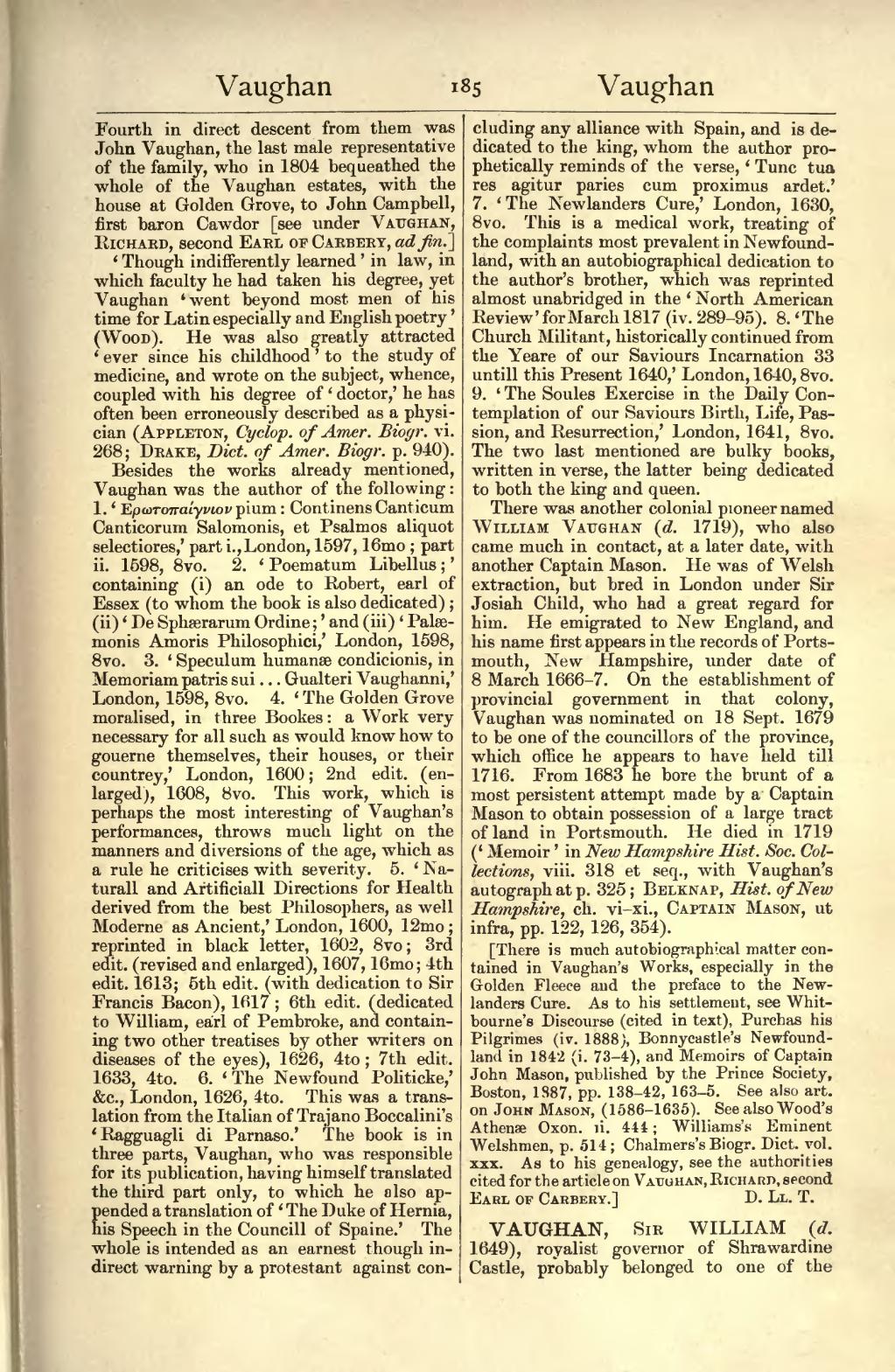Fourth in direct descent from them was John Vaughan, the last male representative of the family, who in 1804 bequeathed the whole of the Vaughan estates, with the house at Golden Grove, to John Campbell, first baron Cawdor [see under Vaughan, Richard, second Earl of Carbery, ad fin.]
'Though indifferently learned' in law, in which faculty he had taken his degree, yet Vaughan 'went beyond most men of his time for Latin especially and English poetry' (Wood). He was also greatly attracted 'ever since his childhood' to the study of medicine, and wrote on the subject, whence, coupled with his degree of 'doctor,' he has often been erroneously described as a physician (Appleton, Cyclop. of Amer. Biogr. vi. 268; Drake, Dict. of Amer. Biogr. p. 940).
Besides the works already mentioned, Vaughan was the author of the following: 1. 'Eρωτοπαίγνιον pium: Continens Canticum Canticorum Salomonis, et Psalmos aliquot selectiores,' part i., London, 1597, 16mo; part ii. 1598, 8vo. 2. 'Poematum Libellus;' containing (i) an ode to Robert, earl of Essex (to whom the book is also dedicated); (ii) 'De Sphaerarum Ordine;' and (iii) 'Palaemonis Amoris Philosophici,' London, 1598, 8vo. 3. 'Speculum humanae condicionis, in Memoriam patris sui . . . Gualteri Vaughanni,' London, 1598, 8vo. 4. 'The Golden Grove moralised, in three Bookes: a Work very necessary for all such as would know how to gouerne themselves, their houses, or their countrey,' London, 1600; 2nd edit, (enlarged), 1608, 8vo. This work, which is perhaps the most interesting of Vaughan's performances, throws much light on the manners and diversions of the age, which as a rule he criticises with severity. 5. 'Naturall and Artificiall Directions for Health derived from the best Philosophers, as well Moderne as Ancient,' London, 1600, 12mo; reprinted in black letter, 1602, 8vo; 3rd edit, (revised and enlarged), 1607, 16mo; 4th edit. 1613; 5th edit, (with dedication to Sir Francis Bacon), 1617; 6th edit, (dedicated to William, earl of Pembroke, and containing two other treatises by other writers on diseases of the eyes), 1626, 4to; 7th edit. 1633, 4to. 6. 'The Newfound Politicke,' &c., London, 1626, 4to. This was a translation from the Italian of Trajano Boccalini's 'Ragguagli di Parnaso.' The book is in three parts, Vaughan, who was responsible for its publication, having himself translated the third part only, to which he also appended a translation of 'The Duke of Hernia, his Speech in the Councill of Spaine.' The whole is intended as an earnest though indirect warning by a protestant against concluding any alliance with Spain, and is dedicated to the king, whom the author prophetically reminds of the verse, 'Tunc tua res agitur paries cum proximus ardet.' 7. 'The Newlanders Cure,' London, 1630, 8vo. This is a medical work, treating of the complaints most prevalent in Newfoundland, with an autobiographical dedication to the author's brother, which was reprinted almost unabridged in the 'North American Review' for March 1817 (iv. 289-95). 8. 'The Church Militant, historically continued from the Yeare of our Saviours Incarnation 33 untill this Present 1640,' London, 1640, 8vo. 9. 'The Soules Exercise in the Daily Contemplation of our Saviours Birth, Life, Passion, and Resurrection,' London, 1641, 8vo. The two last mentioned are bulky books, written in verse, the latter being dedicated to both the king and queen.
There was another colonial pioneer named William Vaughan (d. 1719), who also came much in contact, at a later date, with another Captain Mason. He was of Welsh extraction, but bred in London under Sir Josiah Child, who had a great regard for him. He emigrated to New England, and his name first appears in the records of Portsmouth, New Hampshire, under date of 8 March 1666-7. On the establishment of provincial government in that colony, Vaughan was nominated on 18 Sept. 1679 to be one of the councillors of the province, which office he appears to have held till 1716. From 1683 he bore the brunt of a most persistent attempt made by a Captain Mason to obtain possession of a large tract of land in Portsmouth. He died in 1719 ('Memoir' in New Hampshire Hist. Soc. Collections, viii. 318 et seq., with Vaughan's autograph at p. 325; Belknap, Hist. of New Hampshire, ch. vi-xi., Captain Mason, ut infra, pp. 122, 126, 354).
[There is much autobiographical matter contained in Vaughan's Works, especially in the Golden Fleece and the preface to the Newlanders Cure. As to his settlement, see Whitbourne's Discourse (cited in text), Purchas his Pilgrimes (iv. 1888), Bonnycastle's Newfoundland in 1842 (i. 73-4), and Memoirs of Captain John Mason, published by the Prince Society, Boston, 1887, pp. 138-42, 163-5. See also art. on John Mason, (1586-1635). See also Wood's Athenae Oxon. ii. 444; Williams's Eminent Welshmen, p. 514; Chalmers's Biogr. Dict. vol. xxx. As to his genealogy, see the authorities cited for the article on Vaughan, Richard, second Earl of Carbery.]
VAUGHAN, Sir WILLIAM (d. 1649), royalist governor of Shrawardine Castle, probably belonged to one of the
